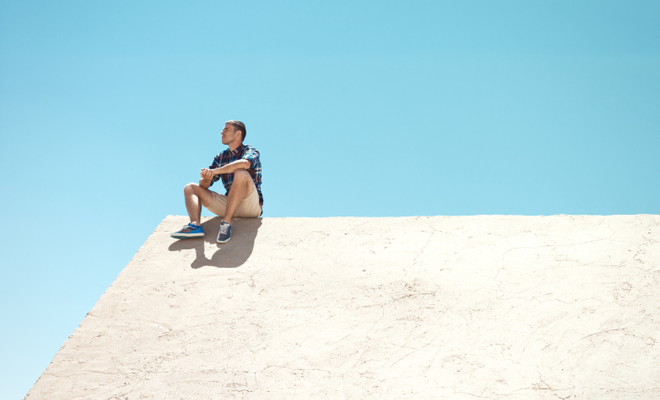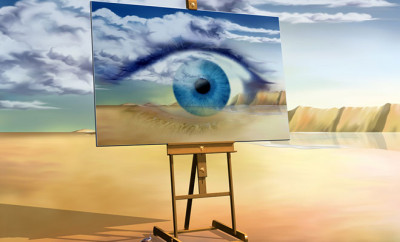
Getting Self Perspective
What particular sequence of methods or processes have you used, that in your experience, has worked well to fuel performance levels, even though the client was set in their ways, and weren’t clear about what they needed? Tessie Lim
In reality, at any given point in time, each one of us can find area’s in ourselves, our lives and performance where we are set in our ways, foggy about what we actually need and in some part even apathetic to attempting any development or change.
Whether we are a professional coach supporting a client through such a discovery or it is we who are passively exploring an area of ourself; until we have stepped back and gained perspective, we will continue to oscillate back and forth inside the level of the issue/opportunity without any meaningful improvement.
Let’s take an example in the workplace during team meetings. Perhaps you are noticing that you always make jokes, play the ‘smart-alec’ and consistently make yourself the centre of attention. You think this is useful to creating a fun and light team environment, so much so that you are certain it is a key to your relationship success. Simultaneously, you are also often frustrated that your peers do not take you seriously and that you are having difficulty influencing those who report to you.
Because we are ‘inside’ our experience, very often we cannot see the obvious link to the mindset / emotions / behaviour and their combined effect on others and ourselves.
Before we can go to methods and processes for developing and enhancing performance, the most critical step is to firstly be able to identify for ourselves the core internal patterns and external behaviours that can be tweaked, ceased, reformed and enhanced; clearly seeing, hearing and feeling the impact they have positively and negatively towards our intentions for ourselves and others.
Almost any other attempt to create change without such personal awareness will be laborious, painful, arduous, and fraught with our internal resistance, fight, or apathy, often resulting in disillusionment and a reluctance to attempt future change or development.
How can we gain such perspective?
While these are not an exhaustive list, they are some of the keys in gaining perspective…
Step into the shoes of others – imagine feeling what it is like to view yourself and hear yourself from another’s perspective, in a specific context. How do you come across? As you watch yourself (through their eyes) what image do you see? What assumptions do you make when you hear your tone of voice and words, seeing your actions from the outside? What do you learn about yourself from this lens?
Another level beyond this is to imagine you are a fly on the wall and able to look over and see, hear, feel and mind-read all the people in the situation, including you. What do you learn from this perspective? What dynamics are at play that you could not see before? What impact do you have? What is the ripple effect?
From here we can take it to the macro effect. Imagine viewing yourself being able to see the entire system and chain of events leading before and after the situation. This will open you to all the consequences and influence this one interaction has on each person in it and the “knock-on effect”. What do you learn from this perspective about yourself and the situation? What opens up?
Perhaps you need to seek the perspective of others. You can do this using formal feedback (360-degree or other assessment tools), and also simply by asking others how they perceive you and your interactions with them. Their perspective will not be the last word or absolute truth about you or your behaviours, but it will be useful data that may support you in stepping back far enough to objectively see and hear yourself.
Another valuable tool is journaling. Start with a presenting irritation, frustration, or the feelings associated with not getting a desired result. Start journaling out how you think and feel about yourself, the situation and the dynamics internally in you (your beliefs, values, etc) and externally (your behaviours, other people and circumstance involved). Put your journal away for at least a day. Read over your entry with fresh eyes, and see what you now discover in terms of patterns, themes, or differences? What opportunities are there in this for your development?
Seek the support of professional coaching. Through skillful questioning a coach will help you, through the very structure of the questions, step back to a vantage point to be able to objectively explore your thoughts, feelings, actions and speech. They will also help you determine some of the tasks mentioned here and other more specific tasks that will help you gain greater awareness of yourself and your opportunity for development. They will also listen for themes and patterns, feeding them back to you for your exploration.
Use universal guidance. Given the systemic inter-connectedness that we all share in being human, our life and those we share it with can be a wonderful reflection, showing us aspects of what we need. Start to notice the themes that unveil themselves in everyday experiences you have. What are they? What are they inviting you to experience? What are you getting animated about? What is the opportunity for you? How do you find yourself restricted or limited in these experiences?
Find an expert. Who do you know in your life or in the world at large, who is exceptional at what you want to be able to experience and achieve? How do they do what they do? What is their inner life that allows for such a performance? What are their habits and rituals? Step back from what you read or discover from speaking to such a person, and begin a contrastive analysis. What are the similarities? What are the differences? Are these differences something that will fit for what you want to specifically achieve? If so what is the opportunity for you to embrace within yourself and develop?
Love failure. If you are a pioneer, it means you will be attempting to achieve something that has not been yet achieved in the world. This could be creating a revolutionary business concept, innovating a new product, creating a new vibrational blueprint, building a community, etc. While there will be individuals and teams who have various facets you could learn from, you are in many ways on a path that you are navigating on your own. You can learn the most from your failures, of what does not work. The more you love those hits and misses, and the more you embrace and mine them for usefulness, the quicker you will be able to discover what you need and what does work.
Use your body’s energy and intelligence. As science has validated, our “mind” is not limited to our brain; our consciousness is present throughout our entire body. Through professional kinesiology we can ask the body many exploratory questions, and use our body’s answers to pinpoint unconscious patterns and internal conflicts that sabotage our success and ability to live and relate authentically.
Get lost in a great novel or movie. Our ability to get lost in a story allows us to get absorbed and opened by the compelling power of metaphor. We get transported out of our own reality, and into a new world. As a result of shifting realities, we can see on screen or the page of our novel, patterns of behaviour and we know the emotional / cognitive issues the characters need to resolve. We can get so involved we speak out loud to the characters, telling them what they ought to do! At the end of the movie / novel we can use the experience of the characters to learn more about ourself? Who am I most similar to in the movie? What do I learn about how I perceived them? Where am I stuck? What is the opportunity for my development? Etc.
Invite emotional intimacy. The more involved we get in our core relationships, the more we can learn about ourself. True authentic relating with those we love, live and work with can be vulnerable and unnerving. We can feel exposed and transparent, open to criticism and personal attack. Each time we recognise such feelings, we are altered that we are in unfamiliar territory, perhaps an opportunity for our exploration and growth. As we experience more, we most often can feel less self-conscious and vulnerable. If we do not find we begin to feel safe and comfortable, this too will be feedback that we have an opportunity to heal whatever holds us back from comfort with such honesty, depth and richness with others.
Using all or any one of these resources for self-discovery and perspective, we can begin to create a well-formed problem, where naturally well-formed solutions can begin to be self-generated by the wisdom of our own resourcefulness and those in our life and world.







